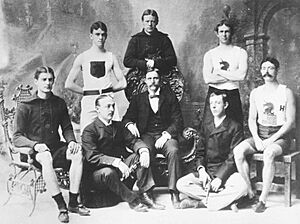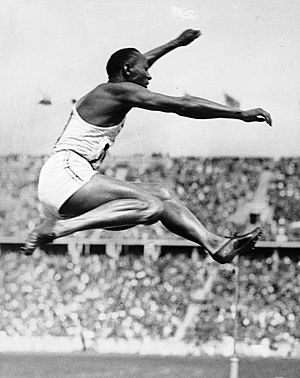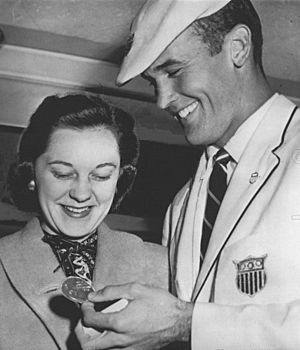United States at the Olympics facts for kids
Quick facts for kids United States at theOlympics |
|||||||||
|---|---|---|---|---|---|---|---|---|---|
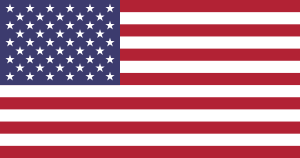
|
|||||||||
| IOC code | USA | ||||||||
| NOC | United States Olympic & Paralympic Committee | ||||||||
| Medals Ranked 1st |
|
||||||||
| Summer appearances | |||||||||
|
|||||||||
| Winter appearances | |||||||||
|
|||||||||
| Other related appearances | |||||||||
| 1906 Intercalated Games | |||||||||
The USA has sent amazing athletes to almost every modern Olympic Games. They only missed the 1980 Summer Olympics because they led a boycott. This was to protest the Soviet Union's actions in Afghanistan. The United States Olympic & Paralympic Committee (USOPC) helps American athletes get ready for the Olympics.
American athletes have won more medals than any other country in Olympic history. They have earned 2,764 medals in total. This includes 1,105 gold medals at the Summer Olympic Games. They also won 330 medals, with 114 gold, at the Winter Olympic Games. The USA has finished first in the Summer Olympic medal count 19 times. This is out of 30 Summer Olympics they have been in. They have not been as successful in the Winter Olympics. They have only placed first once in 24 Winter Games.
The United States is one of the few big teams that does not get money from its government.
Contents
USA as an Olympic Host
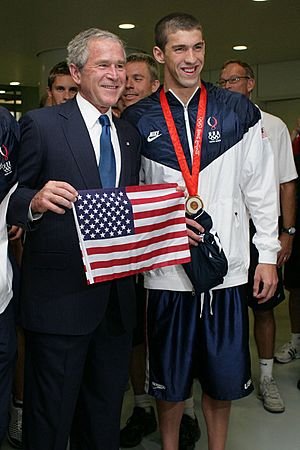
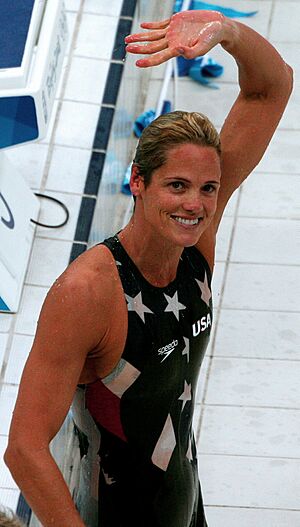
The United States has hosted the modern Olympic Games eight times. This is more than any other country. These games include the 1904 St. Louis Olympics and the 2002 Salt Lake City Winter Olympics. The USA has also helped the Olympics grow. They have improved sports facilities and technology. They also share Olympic values.
For example, the 1932 Los Angeles Olympics used electronic timing for the first time. The 1984 Los Angeles Olympics set new standards for opening and closing ceremonies. Even when not hosting, the USA helps promote the Olympics. Groups like the United States Olympic Committee (USOC) and the International Olympic Committee (IOC) play a big part. Hosting the Olympics helps cities a lot. It improves roads and buildings. It also brings money and tourists. For instance, the 1996 Atlanta Olympics helped improve parts of the city. Many sports venues from that time are still used today.
Los Angeles will host the Summer Olympics again in 2028. This will be the ninth time the USA hosts the Games.
| Games | Host city | Dates | Nations | Participants | Events |
|---|---|---|---|---|---|
| 1904 Summer Olympics | St. Louis, Missouri | July 1 – November 23 | 12 | 666 | 95 |
| 1932 Winter Olympics | Lake Placid, New York | February 7 – 15 | 17 | 252 | 14 |
| 1932 Summer Olympics | Los Angeles, California | July 30 – August 14 | 37 | 1,332 | 117 |
| 1960 Winter Olympics | Squaw Valley, California | February 2 – 20 | 30 | 665 | 27 |
| 1980 Winter Olympics | Lake Placid, New York | February 13 – 24 | 37 | 1,072 | 38 |
| 1984 Summer Olympics | Los Angeles, California | July 28 – August 12 | 140 | 6,829 | 221 |
| 1996 Summer Olympics | Atlanta, Georgia | July 19 – August 4 | 197 | 10,318 | 271 |
| 2002 Winter Olympics | Salt Lake City, Utah | February 8 – 24 | 77 | 2,399 | 78 |
| 2028 Summer Olympics | Los Angeles, California | July 14 – 30 | TBA | TBA | TBA |
| 2034 Winter Olympics | Salt Lake City, Utah | February 10 – 26 | TBA | TBA | TBA |
Olympic Medal Wins by the USA
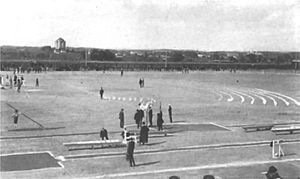
The United States first competed in the Olympics in 1896. This was the very first modern games in Athens. The USA did not always perform the same way before World War I. This was because they sent fewer athletes than host countries. However, at the 1904 Summer Olympics in St. Louis, the USA won the most medals ever. This record still stands today.
During the years between the World Wars, the USA was very successful. They topped the gold and total medal counts at four Summer Games in a row. But they did not win as much at the 1936 Summer Olympics in Berlin. The next Summer Olympics were in 1948 after World War II.
In 1952, the Soviet Union joined the Olympics. They had a government-funded sports program. This program aimed to show their country was better. The Soviet Union's quick rise made people wonder how they did it. Some thought their athletes were not truly amateurs. There were also claims of government-sponsored doping. After 20 years, the USSR won the most gold medals at the 1972 Summer Olympics in Munich. The USA did not top the medal table again in a non-boycotted game until the 1996 Summer Olympics. This was five years after the USSR collapsed.
A great moment for the USA was the 1984 Summer Olympics in Los Angeles. The USA won a record 83 gold medals. This was helped by the Soviet-led boycott. Since the 1990s, the International Olympic Committee has worked for more gender equality. This helped the USA's performance. The USA has topped the Summer Olympics medal table six times since 1992. They also placed second twice.
For a long time, the USA was not strong in the Winter Games. This changed at the 2002 Winter Olympics in Salt Lake City. Hosting the games in 2002 helped the USA's winter sports. Since then, US athletes have done very well. They have never placed below fourth in the medal count. The USA won the most medals (37) at the 2010 Winter Olympics in Vancouver. But they won fewer medals (23) at the 2018 Winter Olympics in Pyeongchang.
Summer Games MedalsHost country
|
Winter Games MedalsHost country
|
||||||||||||||||||||||||||||||||||||||||||||||||||||||||||||||||||||||||||||||||||||||||||||||||||||||||||||||||||||||||||||||||||||||||||||||||||||||||||||||||||||||||||||||||||||||||||||||||||||||||||||||||||||||||||||||||||||||||||||||||||||||||||||||||||||||||||||||||||||||||||||||||||||||||||||||||||||||||||||||||||||||||||||||||||||||||||||||||||||||||||||||||||||||||||||||||||||||||||||||||||||||||||||||||||||||||||||||||||||||||||||||||||||||||||||||||||||||||||||||||||||||||||||||||||||||||||||||
Summer Sports MedalsLeading in that sport
Updated on May 26, 2024
The United States has never won an Olympic medal in these current summer sports: badminton, handball, rhythmic gymnastics, table tennis and trampoline gymnastics. |
Winter Sports MedalsLeading in that sport
Updated on December 31, 2021
The United States has never won an Olympic medal in the following current winter sport: biathlon. |
| Summer | |||
|---|---|---|---|
| Sport | Rank | Athlete | Event & Year |
| Badminton | 8th | Howard Bach & Bob Malaythong |
Men's doubles in 2008 |
| Handball | 5th | United States women's team | Women's tournament in 1984 |
| Rhythmic gymnastics | 9th | Mandy James Alaine Mata-Baquerot Kate Nelson Brandi Siegel Challen Sievers Becky Turner |
Women's group in 1996 |
| Table tennis | 6th | Gao Jun Crystal Huang Wang Chen |
Women's team in 2008 |
| Trampoline gymnastics | 6th | Savannah Vinsant | Women's individual in 2012 |
| Nicole Ahsinger | Women's individual in 2020 | ||
| Winter | |||
| Sport | Rank | Athlete | Event & Year |
| Biathlon | 6th | Lowell Bailey Tim Burke Sean Doherty Leif Nordgren |
Men's relay in 2018 |
USA Olympic Flagbearers
USA Olympic History
Early Olympic Games (1896–1912)
The first modern Olympic Games were in Athens, Greece. The American team had 14 athletes in three sports. Greece, the host, had 169 athletes and won 46 medals. The USA won 20 medals, but they won 11 gold medals. This was more than Greece's 10 golds. So, Team USA finished first in gold medals. James Brendan Connolly was the first modern Olympic champion. He won the triple jump. Thomas Burke won three gold medals in track events. He was the most successful athlete of the 1896 Games. Robert Garrett won two gold medals in discus and shot put. This showed American strength in athletics.
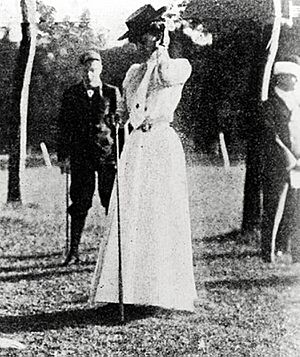
At the 1900 Paris Olympics, the USA team grew to 75 athletes. This was still much less than France's 720 athletes. The most famous American was Margaret Abbott. She became the first American woman to win an Olympic gold medal. She won the women's golf event. Most American medals came from athletics. US athletes won 16 golds and 39 medals there. Alvin Kraenzlein won four gold medals in track and field. Ray Ewry won three gold medals in standing jumps. Walter Tewksbury won two gold medals and one silver. Team USA won only 8 medals outside of athletics. Four of these were in golf. France won the most medals overall. The USA was second, showing great skill with fewer athletes.
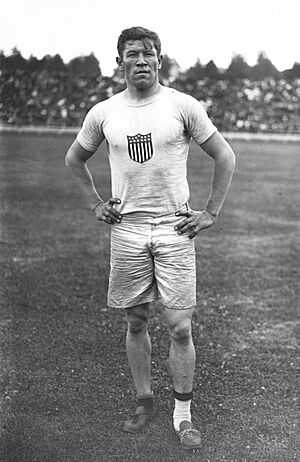
The 1904 Summer Olympics in St. Louis, Missouri, were the first Olympics outside Europe. American athletes did very well in athletics. They won many gold medals. Famous athletes included Archie Hahn, who won three sprint golds. James Lightbody won three middle-distance golds. Ray Ewry won three standing jump golds. Harry Hillman also won multiple track and field golds. The games happened at the same time as a big world's fair.
Team USA continued to be strong in track and field. At the 1908 London Olympics, Ray Ewry won three more standing jump golds. John Taylor won gold in the 400m. Mel Sheppard won gold in the 800m and 1500m. These athletes helped the USA succeed in athletics. A famous moment was in the marathon. Italian runner Dorando Pietri collapsed near the finish line. Officials helped him, but he was disqualified. American Johnny Hayes then won the gold medal.
At the 1912 Stockholm Olympics, American athletes still led in track and field. Jim Thorpe, a Native American athlete, made history. He won gold medals in both the pentathlon and decathlon. This made him a famous Olympic figure. Later, his medals were taken away because he played semi-professional baseball. This was against the rules for amateur athletes. His medals were given back in 1983. In 2022, he was fully recognized as the sole winner. Ralph Craig won gold in the 100 and 200 meters. This showed American strength in sprints. American swimmers also did well. Duke Kahanamoku won two swimming gold medals.
Between the World Wars (1920–1936)
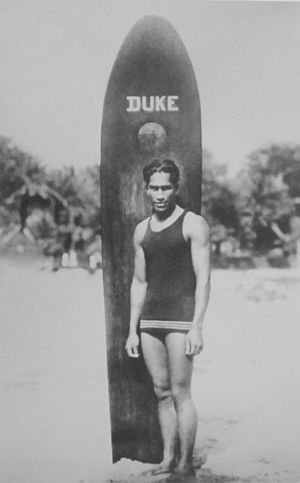
Many famous American athletes competed in the 1920 Olympics. These included swimmer Duke Kahanamoku and decathlete Jim Thorpe. Thorpe won gold medals in both the pentathlon and decathlon. This showed his amazing athletic skills. The 1920 Antwerp Olympics was special for American swimming. Ethelda Bleibtrey became the first American woman to win Olympic gold in swimming. The American basketball team also won gold. They beat Belgium in the final.
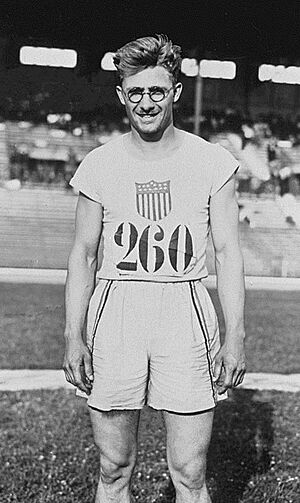
In 1924, at the Paris Olympics, Harold Osborn set a new world record. He won gold in the decathlon. Sprinter and long jumper Charley Paddock won two gold medals. He won the 100 meters and the 4x100 meters relay. Johnny Weissmuller, who later played Tarzan in movies, won two gold medals in swimming at the 1928 Amsterdam Olympics. The USA was very good at diving. Aileen Riggin won gold in women's 3-meter springboard diving. She was the first American woman to win an Olympic diving gold. The American men's basketball team kept winning. They took gold for the third time in a row.
The 1932 Los Angeles Olympics was the first to have outdoor diving events. Track and field was still a strong sport for Team USA. Babe Didrikson had amazing achievements. The United States won the most gold and total medals at these four Games. This showed they were a top sports country. American swimmers continued to excel. Helene Madison won three gold medals in women's freestyle swimming. The USA also did well in team sports. They won gold in basketball and baseball. They also won many medals in rowing. The 1932 Olympics happened during the Great Depression. The success of American athletes gave hope to the nation. The games also showed Los Angeles could host big international events.
In 1936, Jesse Owens became world famous at the Summer Olympics in Berlin, Germany. Owens won four gold medals. He won the 100 meters, long jump, 200 meters, and 4x100-meter relay. His wins showed that the Nazi idea of racial superiority was wrong. However, the USA ranked second in medals for the first time since 1908. The host country, Germany, won more medals. The USA men's basketball team won the gold medal. They continued their strong performance in the sport.
Cold War Era (1948–1992)
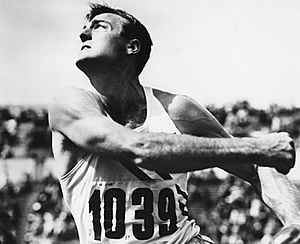
The 1948 London Olympics were the first for new communist countries. These countries were controlled by the Soviet Union after World War II. The Soviets did not compete themselves. They sent observers instead. Their leader, Joseph Stalin, wanted to be sure they would beat the USA. His sports officials said it was 50/50, so he decided not to send a team in 1948. With no Soviet team, the USA easily won the games. They got 38 gold and 84 total medals. This was 22 gold and 40 total medals more than Sweden, who was second. Most medals were in track and field (27) and swimming (15). The US basketball team won its second gold medal. They beat France 65–21 in the final. The 1948 London Olympics were the first to be shown on television more widely. But not many people had TVs yet.
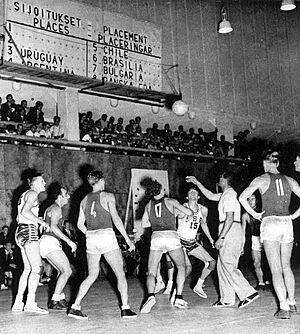
In 1952, in Helsinki, the Soviets sent a team for the first time. This started a new time where the Soviet Union would be very strong in the Olympics. The Soviet government paid their athletes. These athletes trained full-time. The United States still won the most medals at these games. They got 40 gold and 76 total medals. This was more than the Soviets, who were second. American athletes won 31 medals in track and field. This was their best sport. The U.S. basketball team won its third gold medal. They beat the Soviets twice. American boxers won all five finals they entered. American weightlifters won four gold medals, beating the Soviets. The two countries won all seven weightlifting events.
Melbourne hosted the Olympics in 1956. Some people wanted the Soviet Union removed because they had acted against Hungary. But the International Olympic Committee did not do this. So, some countries boycotted the games. The Hungarian water polo team had a famous fight with the Soviets. This was called "Blood in the Water". The USA did well at the games. They won 32 gold and 78 total medals. This put them in second place. They won 5 gold and 24 total medals less than the Soviets. The USA was very strong in track and field, with 31 medals. But they only won 2 golds in swimming. Australia was too strong in swimming. In weightlifting, the USA and Soviets won all seven events again. The USA got four golds. In boxing, the Soviets won 3 golds, and the USA won two. But the USSR was best in gymnastics. They won 11 of 17 events. This helped them get first place overall. The U.S. basketball team won its fourth gold medal. They beat the Soviets 89–55. The 1956 Melbourne Olympics were the first to be shown live by satellite. This let people around the world watch the events.
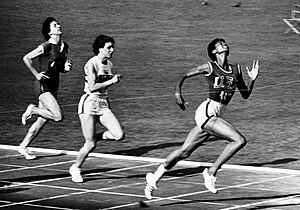
The 1960 Rome Olympics saw the Americans struggle in their usual strong sports. These included track and field and weightlifting. But boxing, swimming, and wrestling had surprisingly good results. In track and field, the USA won 12 golds. Their men's 4x100 relay team was disqualified in a controversial decision. In weightlifting, the Soviets won five of seven events. The USA only got one gold. The U.S. basketball team won its fifth gold medal. The USA won 34 gold and 71 total medals. The USSR won 43 gold and 103 total medals. This showed the USA was no longer the top Olympic power. The 1960 Rome Olympics were the first to be shown widely on CBS in the United States.
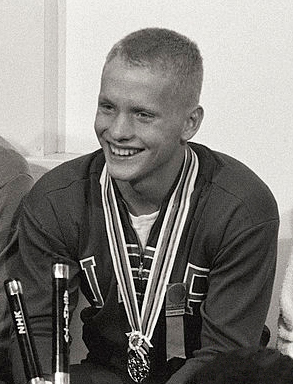
The USA did better at the 1964 Summer Olympics in Tokyo. They were back at the top of the gold medal count for the first time since 1952. The U.S. swimming team was very successful. They won 13 of 18 available golds. They also broke 9 world records. In track and field, the Americans also improved. They won 14 gold and 24 total medals. The Soviets continued to be strong in weightlifting. The USSR won four golds. But for the Americans, the 1964 Olympics were a success. They won 36 gold and 90 total medals. The Soviets won 30 gold and 96 total medals. The USA won the most gold medals. The USSR won the most total medals. The U.S. basketball team won its sixth gold medal. They beat the USSR 73–59.
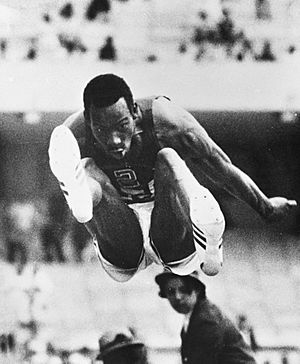
The 1968 Mexico Olympics were the most successful Summer Games for the USA after the war. American athletes won 45 gold and 107 total medals. The U.S. swimming team was amazing. They won 51 medals. They won all three medals in five events. They also won a medal in every swimming event. The U.S. track and field team won 15 gold and 28 total medals. Swimming and athletics gave the USA over 70% of its medals. This helped them get first place in the medal table. It was their first time topping the overall medal table since 1952. In other sports, American athletes did not do as well. The U.S. weightlifting team only won one medal. American boxers won 7 medals, with two golds. U.S. divers won 6 medals. The men's volleyball team beat the Soviet champions. But they did not win a medal. The U.S. basketball team won its seventh gold medal. No other Olympic team in ball sports has done this. This was the last time the USA finished first in a fully attended Summer Olympics until 1996. The 1968 Grenoble Winter Olympics were the first to be shown in color.
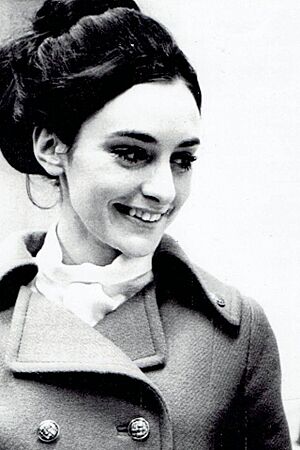
The Munich Olympics were sadly affected by a terrible event. Eleven Israeli athletes and coaches were killed by terrorists. There were calls to stop the games, but the IOC decided not to. From a sports view, these games were very controversial for American athletes. U.S. world record holders in the 100 meters missed their race. They were given the wrong start time. In swimming, a U.S. gold medalist lost his medal. He used his asthma medicine, which was banned. This also stopped him from winning more medals. U.S. boxers felt they were judged unfairly against communist opponents. In shooting, a U.S. athlete won gold but was moved to silver after a review.
The most controversial event was the U.S. basketball team final. They seemed to win against the Soviet Union. But the last three seconds were replayed three times. The Soviets then won. The Americans refused their silver medals. They felt they were cheated. This was the first time the USA lost in Olympic basketball. It ended their 63-game winning streak. Overall, the U.S. team did not do as well. They won only 6 gold medals in track and field. East Germany won 8, and the Soviets won 9. But the Americans still won the most total medals (22). In boxing, Cuba and the Soviets won most golds. The USA won only one gold. In diving, Americans won three medals. In wrestling, the U.S. team surprised with three freestyle golds. In water polo, the Americans won bronze. Swimming was the only sport where the American team did great. They won 17 gold and 43 total medals. American women were very strong in swimming for the last time until 1992.
The Eastern Bloc countries were very strong at the 1976 Montreal Olympics. Seven of them were in the top ten for medals. The United States team finished third for the first time. This Olympics had big differences. The U.S. men's swimming team was amazing. They won 12 gold and 27 total medals out of 13 events. They broke 11 world records. But the US women's swimming team faced a big challenge. It was later found that East German athletes were using banned substances. Still, the American women won one gold medal. They upset the East Germans in the 4x100 freestyle relay. This win was a huge surprise. In track and field, East Germany won many medals. This helped the USSR win the most medals overall. The U.S. boxing team did very well. They reached six gold medal fights and won five. This was like their great team in 1952. These boxers were younger and less experienced. In other sports, U.S. divers won five medals, including two golds. The U.S. equestrian team won four medals. American shooters won three medals. A woman won a historic silver in mixed rifle shooting. U.S. freestyle wrestlers won one gold and six medals overall. The U.S. men's basketball team won gold again. The women's team won a surprising silver. The Soviets and East Germans were very strong in many sports. They finished first and second in medals. The U.S. won medals in 14 sports. They finished third with 34 gold and 94 total medals. July 31 was the best day for Americans. They won 8 gold and 18 total medals.
The 1980 Summer Olympics were different for the United States. The USA led the biggest boycott in Olympic history. This was because the Soviet Union had acted against Afghanistan. The United States and 65 other countries did not go to the Moscow Games. This made it the smallest Olympics since 1956. As expected, the host country and East Germany won almost all the medals. This was the most unbalanced medal count since 1904. The Soviets won 80 gold medals, a record. They also won 195 total medals, their second-best ever.

In 1984, Los Angeles hosted the Games. The Soviets and their allies boycotted in return. They said they were worried about safety. But no threats were found. Romania, an Eastern Bloc country, did attend. Their athletes had no problems. They were cheered loudly at the Opening Ceremonies. Romania even finished second in the medal table. Despite the Soviet boycott, a record 140 nations attended. This included China, who joined for the first time since 1952. The 1984 Los Angeles Olympics were the first to be shown on many TV channels at once. This gave viewers more choices.

Some people worried the Soviet Union would boycott the 1988 Summer Olympics in Seoul. This was because South Korea and the USSR did not have good relations. But new policies by Gorbachev led to Soviet participation. Cuba decided to boycott on its own. This affected the boxing events. The Soviets and East Germany were very strong in what would be their last Olympics. They won 55 and 37 gold medals. The United States finished third with 36 gold and 94 total medals. 1976 and 1988 are the only times America was not in the top two at the Summer Olympics.
Recent Olympic Games (1994–Present)

American athletes have been in every Summer Olympics recently. Their results have gotten better since 1992. America was second in medals in 1992 and 2008. But they finished first at seven other Games during this time.
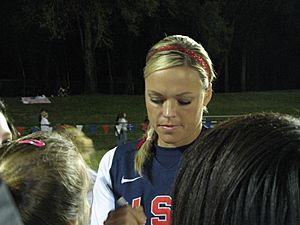
The United States, through the United States Olympic & Paralympic Committee (USOPC), competed at the 2020 Summer Olympics in Tokyo. These Games were moved to 2021 because of the COVID-19 pandemic. The opening ceremony flag-bearers were baseball player Eddy Alvarez and basketball player Sue Bird. Javelin thrower Kara Winger was the flag-bearer for the closing ceremony.
When Simone Biles did not compete in the gymnastics all-around final, her teammates stepped up. The U.S. had won this event five times in a row. Sunisa Lee performed wonderfully and won the gold medal. She became the first Hmong American gymnast to win Olympic gold. She was also the first gymnast of Asian descent to do so. Lee won three medals in Tokyo: a silver in the team final and a bronze in uneven bars. Lydia Jacoby, a teen swimmer from Alaska, made history. She was the first Alaskan swimmer on the U.S. Olympic team. She surprised everyone by winning gold in the women's 100m breaststroke. Golfer Nelly Korda won gold in the women's golf. She followed her teammate Xander Schauffele who also won gold. Shot putter Ryan Crouser won his Olympic title again. He set a new Olympic record three times. The U.S. won the most medals overall, with 113. They barely beat China for gold medals on the last day, with 39 golds to China's 38.

At the 2022 Winter Olympics, the U.S. did a diplomatic boycott. This meant they did not send high-level officials. This was due to human rights concerns. But athletes were still allowed to compete. The USA won 25 medals. This was two more than in 2018. But it was less than the 37 medals in 2010 and 28 in 2014.
Some big successes included Jessie Diggins. She was the first American woman to win individual cross-country medals. Figure skater Nathan Chen broke a world record. He won Olympic gold in men’s singles. Erin Jackson was the first black woman to win speed skating gold. Chloe Kim won her title again in snowboarding halfpipe. Veteran snowboarder Lindsey Jacobellis won two gold medals. She won the women's snowboard cross. She also won with teammate Nick Baumgartner in the mixed snowboard cross.
Amateur and Professional Athletes

The rule against professional athletes caused problems in Olympic history. Jim Thorpe, a champion in 1912, lost his medals. It was found he played semi-professional baseball. His medals were given back after he passed away in 1983.
Countries in the Eastern Bloc had "full-time amateur athletes." These athletes were paid by their governments to train. This put Western athletes, who paid for themselves, at a disadvantage. The Olympics changed this rule. They started allowing professional athletes in the 1990s. This happened after the collapse of the Soviet Union.
Prize Money for Athletes
When a U.S. athlete wins an Olympic medal, they get money from the USOPC. As of 2016, a gold medal earned $25,000. Silver was $15,000, and bronze was $10,000. In 2017, these amounts increased by 25%. Gold became $37,000, silver $22,500, and bronze $15,000. These amounts are lower than in some other countries. Some countries pay up to $1 million for a gold medal. Since 2018, Paralympic athletes get the same prize money as Olympians.
Images for kids
See also
 In Spanish: Estados Unidos en los Juegos Olímpicos para niños
In Spanish: Estados Unidos en los Juegos Olímpicos para niños
- List of United States Olympic medalists
- United States at the Paralympics
- United States at the Summer Olympics
- United States at the Winter Olympics
- United States at the Pan American Games
- Four territories of the United States send independent Olympic teams (American Samoa, Guam, Puerto Rico, and the United States Virgin Islands)


